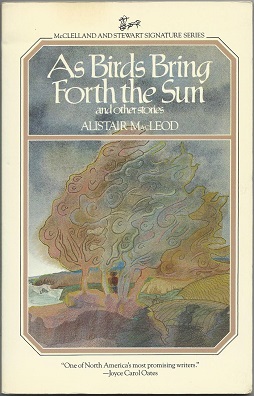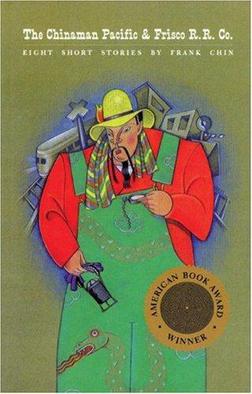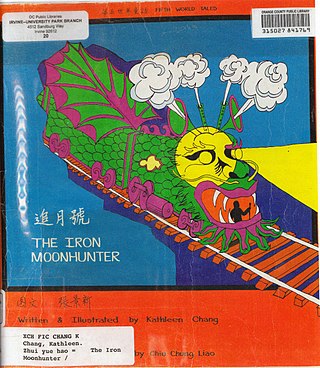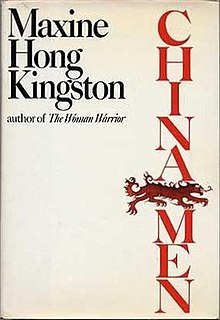
Maxine Hong Kingston is an American novelist. She is a Professor Emerita at the University of California, Berkeley, where she graduated with a BA in English in 1962. Kingston has written three novels and several works of non-fiction about the experiences of Chinese Americans.

The Yellow Peril is a racist color metaphor that depicts the peoples of East and Southeast Asia as an existential danger to the Western world.

The Woman Warrior: Memoirs of a Girlhood Among Ghosts is a book written by Chinese American author Maxine Hong Kingston and published by Alfred A. Knopf in 1976. The book blends autobiography with old Chinese folktales.

Frank Chin is an American author and playwright. He is considered to be one of the pioneers of Asian-American theatre.

A Good Scent from a Strange Mountain is a 1992 collection of short stories by Robert Olen Butler. It received the Pulitzer Prize for Fiction in 1993.
Stereotypes of East Asians in the United States are ethnic stereotypes found in American society about first-generation immigrants and their American-born descendants and citizenry with East Asian ancestry or whose family members who recently emigrated to the United States from East Asia, as well as members of the Chinese diaspora whose family members emigrated from Southeast Asian countries. Stereotypes of East Asians, analogous to other ethnic and racial stereotypes, are often erroneously misunderstood and negatively portrayed in American mainstream media, cinema, music, television, literature, video games, internet, as well as in other forms of creative expression in American culture and society. Many of these commonly generalized stereotypes are largely correlative to those that are also found in other Anglosphere countries, such as in Australia, Canada, New Zealand, and the United Kingdom, as entertainment and mass media are often closely interlinked between them.
Ann Marie Fleming is an independent Canadian filmmaker, writer, and visual artist. She was born in Okinawa, USCAR, in 1962 and is of Chinese, Ryukyuan and Australian descent. Her film Window Horses was released in 2016.

Grandfather's Journey is a children’s picture book by Allen Say. The story is told from the perspective of Say, who narrates his grandfather’s immigration between Japan and the United States. Say’s grandfather subsequently moves back to Japan. Released by Houghton Mifflin, the book was positively received by critics and reviewers, and Say received the Caldecott Medal for illustration in 1994. Grandfather’s Journey is often cited as a culturally significant work in its AAPI representation. In 2008, Weston Woods Studios, Inc. made a film based on the book, narrated by B. D. Wong.

As Birds Bring Forth the Sun and Other Stories is a collection of short stories by Canadian author Alistair MacLeod set predominantly in Cape Breton Island, Nova Scotia and in Newfoundland. It was originally published in 1986. All of its stories were later republished in Island. Macleod explores how family stories and myths, even though they are fictitious, fold into the present to provide comfort in times of emotional distress. The narrator retells the family history of an ancestor who saves and nurtures back to health an injured puppy on the brink of death, only to be violently killed by the dog's offspring a few years later. The dog, known in the stories as the "grey dog of death", consistently appears at times in the family's history as an omen of imminent death for a relative. The narrator is reminded of the story as he and his siblings sit in a Toronto hospital at the bedside of their ill father. While none of them mention the story to each other, it is clear to the narrator they are all thinking about it, thinking about how even its mention may signal the death of their father.
Chinaman is an offensive term referring to a Chinese man or person, or widely a person native to geographical East Asia or of perceived East Asian ethnicity. The term is noted as having pejorative overtones by modern dictionaries. Its derogatory connotations evolved from its use in pejorative contexts regarding Chinese people and other East Asians, as well as its grammatical incorrectness which resembles stereotypical characterizations of Chinese accents in English-speaking associated with discrimination. The usage of the term Chinaman is strongly discouraged by Asian American organizations.

Eat a Bowl of Tea is a 1961 novel by American writer Louis Chu. It was the first Chinese American novel set in Chinese America. Because of its portrayal of the "bachelor society" in New York's Chinatown after World War II, it has become an important work in Asian American studies. It has been cited as an influence by such authors as Frank Chin and Maxine Hong Kingston. It was made into a film of the same name by Wayne Wang in 1989.
Hisaye Yamamoto was an American author known for the short story collection Seventeen Syllables and Other Stories, first published in 1988. Her work confronts issues of the Japanese immigrant experience in America, the disconnect between first and second-generation immigrants, as well as the difficult role of women in society.

The Year of the Dragon is a play written by Chinese American playwright Frank Chin. It is one of the first plays by an Asian American playwright to be produced on a mainstream New York stage. It premiered in 1974 at the American Place Theatre, and starred Randall Duk Kim, who had played the lead in Chin's earlier play, The Chickencoop Chinaman. The rest of the cast included Pat Suzuki, Tina Chen, Conrad Yama, Lilah Kan, Doug Higgins, and Keenan Shimizu.

Tripmaster Monkey: His Fake Book is the third book written by Maxine Hong Kingston, and was published in 1989. The story follows Wittman Ah Sing, an American graduate of University of California, Berkeley of Chinese ancestry in his adventures about San Francisco during the 1960s. Heavily influenced by the Beat movement, and exhibiting many prototypical features of postmodernism, the book retains numerous themes, such as ethnicity and prejudice, addressed in Kingston's other works. The novel is rampant with allusions to pop-culture and literature, especially the 16th century Chinese novel Journey to the West.
Chinese American literature is the body of literature produced in the United States by writers of Chinese descent. The genre began in the 19th century and flowered in the 20th with such authors as Sui Sin Far, Frank Chin, Maxine Hong Kingston, and Amy Tan.

The Chinaman Pacific and Frisco R.R. Co. is a 1988 short-story collection by Frank Chin that collects many of the short stories he had published in the 1970s. It won the American Book Award. The collection deals with Chinese-American history by recalling the work of early Chinese immigrants in such jobs as "coolie, railworker and launderer".
The Chickencoop Chinaman is a 1972 play by Frank Chin. It was the first play written by an Asian American to have a major New York production.

Paper sons or paper daughters is a term used to refer to Chinese people who were born in China and illegally immigrated to the United States and Canada by purchasing documentation which stated that they were blood relatives to Chinese people who had already received U.S. or Canadian citizenship or residency. Typically it would be relation by being a son or a daughter. Several historical events such as the Chinese Exclusion Act and San Francisco earthquake of 1906 caused the illegal documents to be produced.

Do Not Say We Have Nothing is a novel by Madeleine Thien published in 2016 in Canada. It follows a 10-year-old girl and her mother who invite a Chinese refugee into their home. Critically acclaimed, in 2016 the author was awarded both the Scotiabank Giller Prize and the Governor General's Award for this novel. It was short-listed for the Man Booker Prize as well as the Women's Prize for Fiction.

The Iron Moonhunter is a short children's picture book published in 1977, written and illustrated by the activist Kathleen Chang. The book purportedly retells a Chinese-American myth set in the Sierra Nevada mountains during the construction of the First transcontinental railroad, starting in the fall of 1866.














